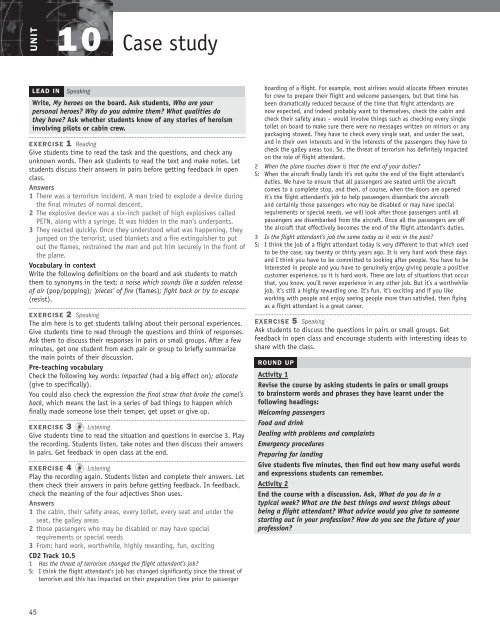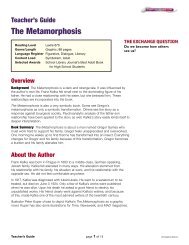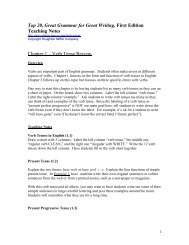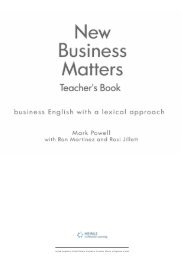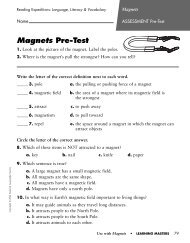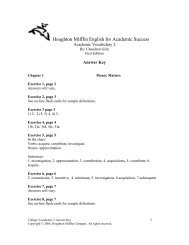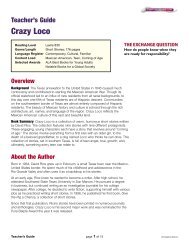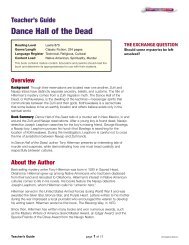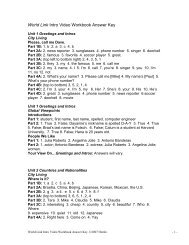English for Cabin Crew Trainer's Guide - Heinle
English for Cabin Crew Trainer's Guide - Heinle
English for Cabin Crew Trainer's Guide - Heinle
Create successful ePaper yourself
Turn your PDF publications into a flip-book with our unique Google optimized e-Paper software.
UNIT<br />
10 Case study<br />
LEAD IN Speaking<br />
Write, My heroes on the board. Ask students, Who are your<br />
personal heroes? Why do you admire them? What qualities do<br />
they have? Ask whether students know of any stories of heroism<br />
involving pilots or cabin crew.<br />
EXERCISE 1 Reading<br />
Give students time to read the task and the questions, and check any<br />
unknown words. Then ask students to read the text and make notes. Let<br />
students discuss their answers in pairs be<strong>for</strong>e getting feedback in open<br />
class.<br />
Answers<br />
1 There was a terrorism incident. A man tried to explode a device during<br />
the fi nal minutes of normal descent.<br />
2 The explosive device was a six-inch packet of high explosives called<br />
PETN, along with a syringe. It was hidden in the man’s underpants.<br />
3 They reacted quickly. Once they understood what was happening, they<br />
jumped on the terrorist, used blankets and a fi re extinguisher to put<br />
out the fl ames, restrained the man and put him securely in the front of<br />
the plane.<br />
Vocabulary in context<br />
Write the following defi nitions on the board and ask students to match<br />
them to synonyms in the text: a noise which sounds like a sudden release<br />
of air (pop/popping); ‘pieces’ of fi re (fl ames); fi ght back or try to escape<br />
(resist).<br />
EXERCISE 2 Speaking<br />
The aim here is to get students talking about their personal experiences.<br />
Give students time to read through the questions and think of responses.<br />
Ask them to discuss their responses in pairs or small groups. After a few<br />
minutes, get one student from each pair or group to briefl y summarize<br />
the main points of their discussion.<br />
Pre-teaching vocabulary<br />
Check the following key words: impacted (had a big effect on); allocate<br />
(give to specifi cally).<br />
You could also check the expression the fi nal straw that broke the camel’s<br />
back, which means the last in a series of bad things to happen which<br />
fi nally made someone lose their temper, get upset or give up.<br />
EXERCISE 3 Listening<br />
Give students time to read the situation and questions in exercise 3. Play<br />
the recording. Students listen, take notes and then discuss their answers<br />
in pairs. Get feedback in open class at the end.<br />
EXERCISE 4 Listening<br />
Play the recording again. Students listen and complete their answers. Let<br />
them check their answers in pairs be<strong>for</strong>e getting feedback. In feedback,<br />
check the meaning of the four adjectives Shon uses.<br />
Answers<br />
1 the cabin, their safety areas, every toilet, every seat and under the<br />
seat, the galley areas<br />
2 those passengers who may be disabled or may have special<br />
requirements or special needs<br />
3 From: hard work, worthwhile, highly rewarding, fun, exciting<br />
CD2 Track 10.5<br />
1 Has the threat of terrorism changed the fl ight attendant’s job?<br />
S: I think the fl ight attendant’s job has changed signifi cantly since the threat of<br />
terrorism and this has impacted on their preparation time prior to passenger<br />
45<br />
boarding of a fl ight. For example, most airlines would allocate fi fteen minutes<br />
<strong>for</strong> crew to prepare their fl ight and welcome passengers, but that time has<br />
been dramatically reduced because of the time that fl ight attendants are<br />
now expected, and indeed probably want to themselves, check the cabin and<br />
check their safety areas – would involve things such as checking every single<br />
toilet on board to make sure there were no messages written on mirrors or any<br />
packaging stowed. They have to check every single seat, and under the seat,<br />
and in their own interests and in the interests of the passengers they have to<br />
check the galley areas too. So, the threat of terrorism has defi nitely impacted<br />
on the role of fl ight attendant.<br />
2 When the plane touches down is that the end of your duties?<br />
S: When the aircraft fi nally lands it’s not quite the end of the fl ight attendant’s<br />
duties. We have to ensure that all passengers are seated until the aircraft<br />
comes to a complete stop, and then, of course, when the doors are opened<br />
it’s the fl ight attendant’s job to help passengers disembark the aircraft<br />
and certainly those passengers who may be disabled or may have special<br />
requirements or special needs, we will look after those passengers until all<br />
passengers are disembarked from the aircraft. Once all the passengers are off<br />
the aircraft that effectively becomes the end of the fl ight attendant’s duties.<br />
3 Is the fl ight attendant’s job the same today as it was in the past?<br />
S: I think the job of a fl ight attendant today is very different to that which used<br />
to be the case, say twenty or thirty years ago. It is very hard work these days<br />
and I think you have to be committed to looking after people. You have to be<br />
interested in people and you have to genuinely enjoy giving people a positive<br />
customer experience, so it is hard work. There are lots of situations that occur<br />
that, you know, you’ll never experience in any other job. But it’s a worthwhile<br />
job, it’s still a highly rewarding one. It’s fun, it’s exciting and if you like<br />
working with people and enjoy seeing people more than satisfi ed, then fl ying<br />
as a fl ight attendant is a great career.<br />
EXERCISE 5 Speaking<br />
Ask students to discuss the questions in pairs or small groups. Get<br />
feedback in open class and encourage students with interesting ideas to<br />
share with the class.<br />
ROUND UP<br />
Activity 1<br />
Revise the course by asking students in pairs or small groups<br />
to brainstorm words and phrases they have learnt under the<br />
following headings:<br />
Welcoming passengers<br />
Food and drink<br />
Dealing with problems and complaints<br />
Emergency procedures<br />
Preparing <strong>for</strong> landing<br />
Give students fi ve minutes, then fi nd out how many useful words<br />
and expressions students can remember.<br />
Activity 2<br />
End the course with a discussion. Ask, What do you do in a<br />
typical week? What are the best things and worst things about<br />
being a fl ight attendant? What advice would you give to someone<br />
starting out in your profession? How do you see the future of your<br />
profession?


